The Aroma Shop: Business Communication Skills for China Market
VerifiedAdded on 2023/06/14
|6
|2042
|64
Essay
AI Summary
This essay delves into the critical role of business communication skills and cross-cultural understanding for successful market penetration, specifically focusing on Mary's 'The Aroma Shop' aiming to expand into the Chinese market. It highlights key Chinese business etiquettes, including the importance of small talk, strong relationships, hierarchical order, and appropriate greetings. The essay also examines the impact of cross-cultural communication, emphasizing the need for cultural adaptation and effective non-verbal communication. The Hofstede model is used to compare cultural differences between Australia and China, analyzing power relations, individualism, masculinity, uncertainty avoidance, long-term orientation, and indulgence. The essay concludes with recommendations for Mary, such as punctuality, formal attire, respectful greetings, and the strategic use of body language, to enhance her chances of successful market penetration in China. Desklib offers a wealth of similar resources for students seeking to excel in their studies.
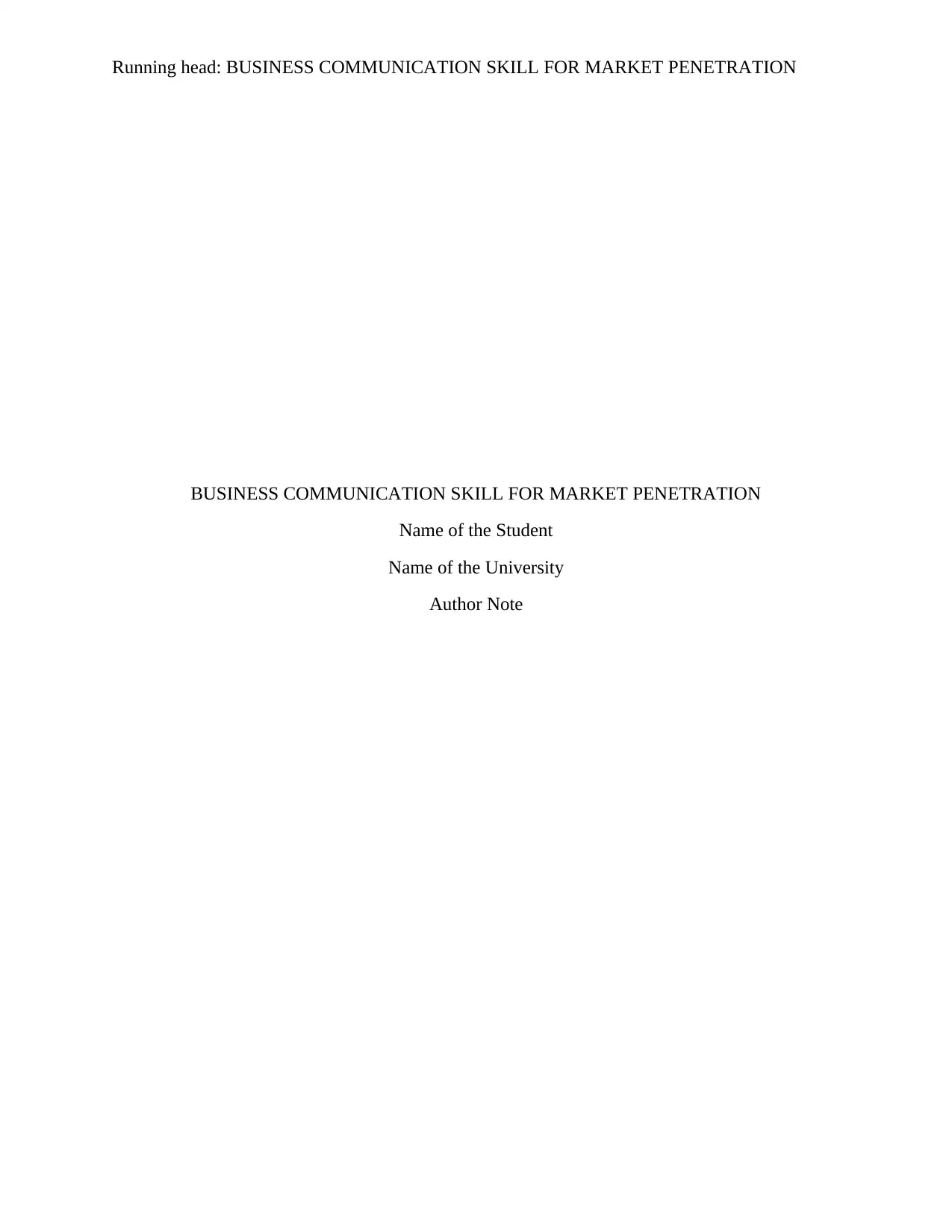
Running head: BUSINESS COMMUNICATION SKILL FOR MARKET PENETRATION
BUSINESS COMMUNICATION SKILL FOR MARKET PENETRATION
Name of the Student
Name of the University
Author Note
BUSINESS COMMUNICATION SKILL FOR MARKET PENETRATION
Name of the Student
Name of the University
Author Note
Paraphrase This Document
Need a fresh take? Get an instant paraphrase of this document with our AI Paraphraser
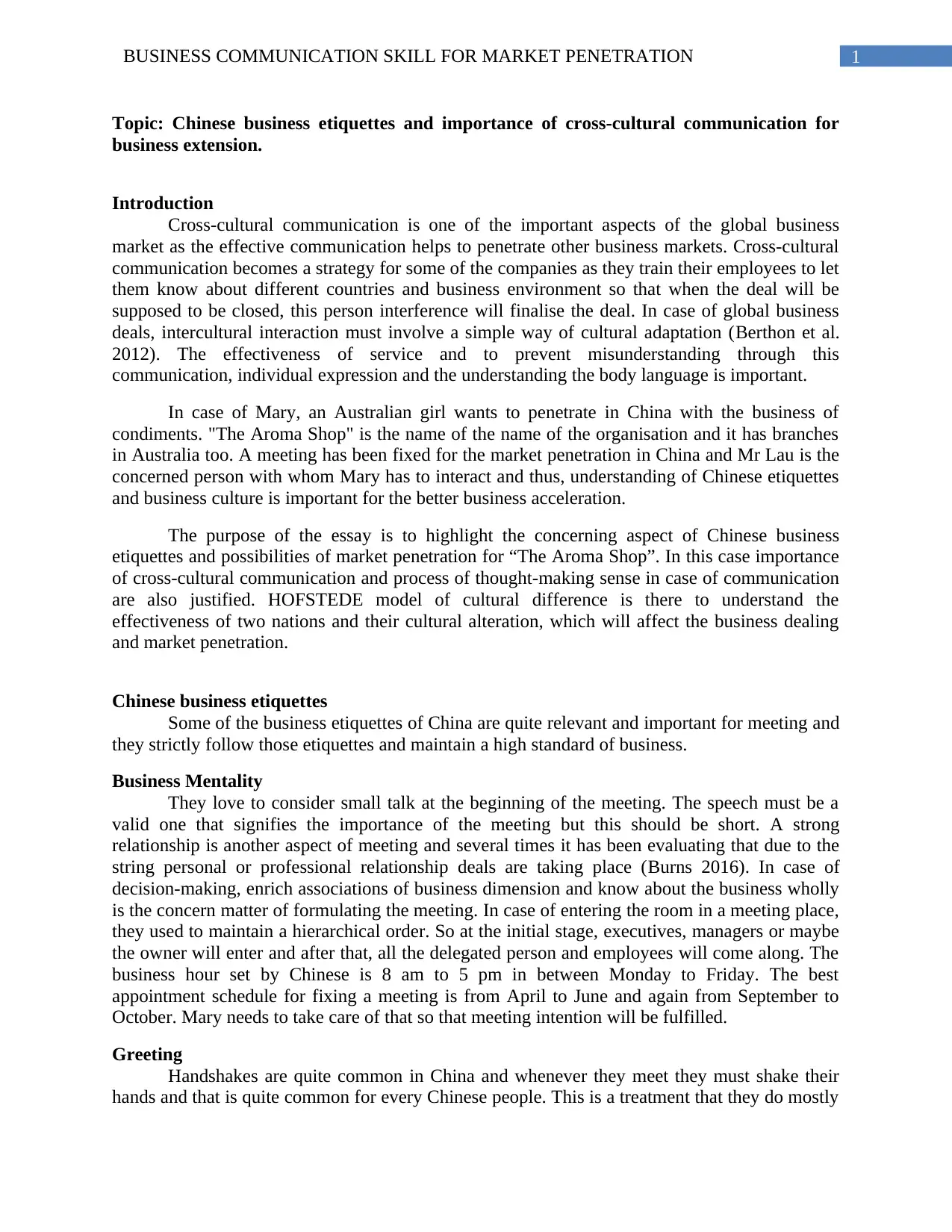
1BUSINESS COMMUNICATION SKILL FOR MARKET PENETRATION
Topic: Chinese business etiquettes and importance of cross-cultural communication for
business extension.
Introduction
Cross-cultural communication is one of the important aspects of the global business
market as the effective communication helps to penetrate other business markets. Cross-cultural
communication becomes a strategy for some of the companies as they train their employees to let
them know about different countries and business environment so that when the deal will be
supposed to be closed, this person interference will finalise the deal. In case of global business
deals, intercultural interaction must involve a simple way of cultural adaptation (Berthon et al.
2012). The effectiveness of service and to prevent misunderstanding through this
communication, individual expression and the understanding the body language is important.
In case of Mary, an Australian girl wants to penetrate in China with the business of
condiments. "The Aroma Shop" is the name of the name of the organisation and it has branches
in Australia too. A meeting has been fixed for the market penetration in China and Mr Lau is the
concerned person with whom Mary has to interact and thus, understanding of Chinese etiquettes
and business culture is important for the better business acceleration.
The purpose of the essay is to highlight the concerning aspect of Chinese business
etiquettes and possibilities of market penetration for “The Aroma Shop”. In this case importance
of cross-cultural communication and process of thought-making sense in case of communication
are also justified. HOFSTEDE model of cultural difference is there to understand the
effectiveness of two nations and their cultural alteration, which will affect the business dealing
and market penetration.
Chinese business etiquettes
Some of the business etiquettes of China are quite relevant and important for meeting and
they strictly follow those etiquettes and maintain a high standard of business.
Business Mentality
They love to consider small talk at the beginning of the meeting. The speech must be a
valid one that signifies the importance of the meeting but this should be short. A strong
relationship is another aspect of meeting and several times it has been evaluating that due to the
string personal or professional relationship deals are taking place (Burns 2016). In case of
decision-making, enrich associations of business dimension and know about the business wholly
is the concern matter of formulating the meeting. In case of entering the room in a meeting place,
they used to maintain a hierarchical order. So at the initial stage, executives, managers or maybe
the owner will enter and after that, all the delegated person and employees will come along. The
business hour set by Chinese is 8 am to 5 pm in between Monday to Friday. The best
appointment schedule for fixing a meeting is from April to June and again from September to
October. Mary needs to take care of that so that meeting intention will be fulfilled.
Greeting
Handshakes are quite common in China and whenever they meet they must shake their
hands and that is quite common for every Chinese people. This is a treatment that they do mostly
Topic: Chinese business etiquettes and importance of cross-cultural communication for
business extension.
Introduction
Cross-cultural communication is one of the important aspects of the global business
market as the effective communication helps to penetrate other business markets. Cross-cultural
communication becomes a strategy for some of the companies as they train their employees to let
them know about different countries and business environment so that when the deal will be
supposed to be closed, this person interference will finalise the deal. In case of global business
deals, intercultural interaction must involve a simple way of cultural adaptation (Berthon et al.
2012). The effectiveness of service and to prevent misunderstanding through this
communication, individual expression and the understanding the body language is important.
In case of Mary, an Australian girl wants to penetrate in China with the business of
condiments. "The Aroma Shop" is the name of the name of the organisation and it has branches
in Australia too. A meeting has been fixed for the market penetration in China and Mr Lau is the
concerned person with whom Mary has to interact and thus, understanding of Chinese etiquettes
and business culture is important for the better business acceleration.
The purpose of the essay is to highlight the concerning aspect of Chinese business
etiquettes and possibilities of market penetration for “The Aroma Shop”. In this case importance
of cross-cultural communication and process of thought-making sense in case of communication
are also justified. HOFSTEDE model of cultural difference is there to understand the
effectiveness of two nations and their cultural alteration, which will affect the business dealing
and market penetration.
Chinese business etiquettes
Some of the business etiquettes of China are quite relevant and important for meeting and
they strictly follow those etiquettes and maintain a high standard of business.
Business Mentality
They love to consider small talk at the beginning of the meeting. The speech must be a
valid one that signifies the importance of the meeting but this should be short. A strong
relationship is another aspect of meeting and several times it has been evaluating that due to the
string personal or professional relationship deals are taking place (Burns 2016). In case of
decision-making, enrich associations of business dimension and know about the business wholly
is the concern matter of formulating the meeting. In case of entering the room in a meeting place,
they used to maintain a hierarchical order. So at the initial stage, executives, managers or maybe
the owner will enter and after that, all the delegated person and employees will come along. The
business hour set by Chinese is 8 am to 5 pm in between Monday to Friday. The best
appointment schedule for fixing a meeting is from April to June and again from September to
October. Mary needs to take care of that so that meeting intention will be fulfilled.
Greeting
Handshakes are quite common in China and whenever they meet they must shake their
hands and that is quite common for every Chinese people. This is a treatment that they do mostly
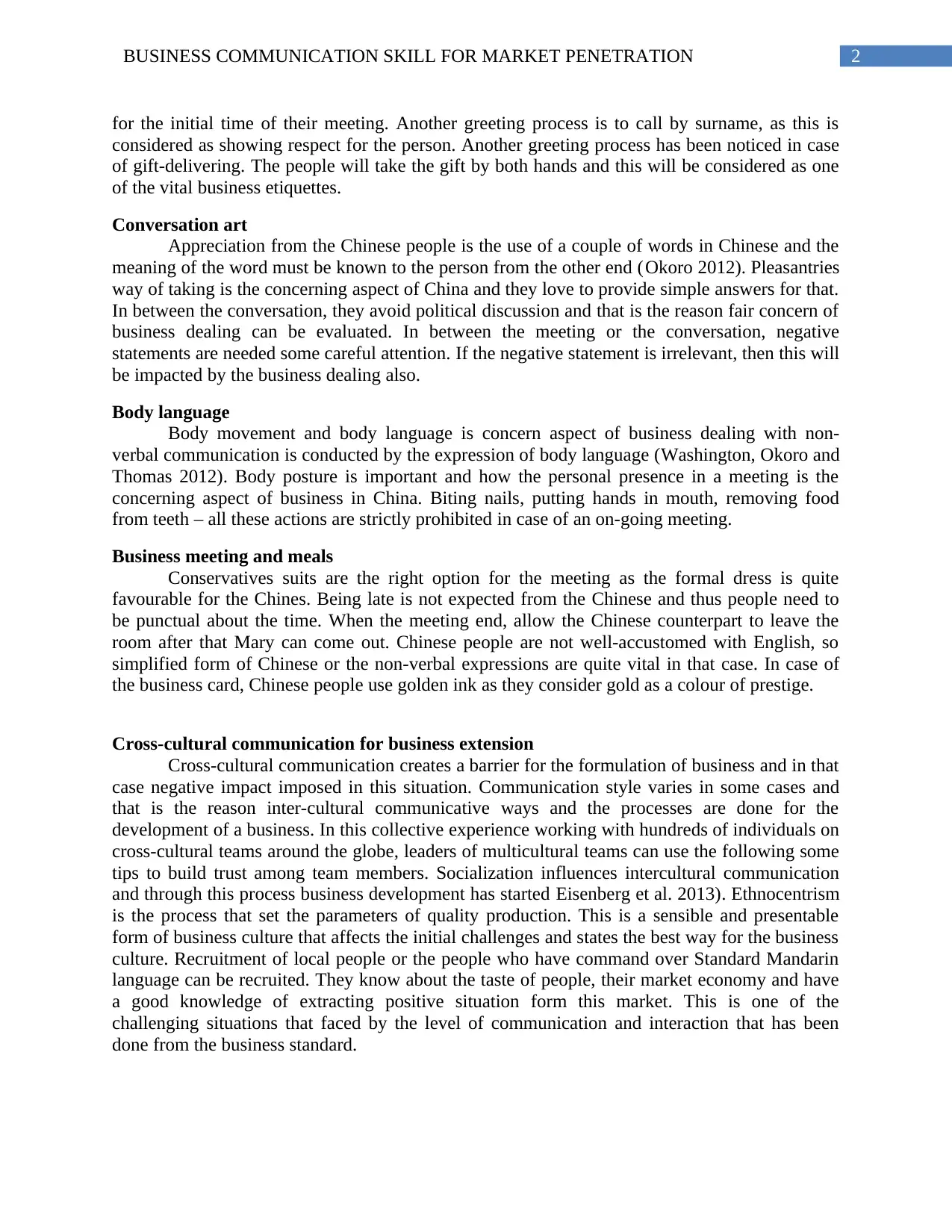
2BUSINESS COMMUNICATION SKILL FOR MARKET PENETRATION
for the initial time of their meeting. Another greeting process is to call by surname, as this is
considered as showing respect for the person. Another greeting process has been noticed in case
of gift-delivering. The people will take the gift by both hands and this will be considered as one
of the vital business etiquettes.
Conversation art
Appreciation from the Chinese people is the use of a couple of words in Chinese and the
meaning of the word must be known to the person from the other end (Okoro 2012). Pleasantries
way of taking is the concerning aspect of China and they love to provide simple answers for that.
In between the conversation, they avoid political discussion and that is the reason fair concern of
business dealing can be evaluated. In between the meeting or the conversation, negative
statements are needed some careful attention. If the negative statement is irrelevant, then this will
be impacted by the business dealing also.
Body language
Body movement and body language is concern aspect of business dealing with non-
verbal communication is conducted by the expression of body language (Washington, Okoro and
Thomas 2012). Body posture is important and how the personal presence in a meeting is the
concerning aspect of business in China. Biting nails, putting hands in mouth, removing food
from teeth – all these actions are strictly prohibited in case of an on-going meeting.
Business meeting and meals
Conservatives suits are the right option for the meeting as the formal dress is quite
favourable for the Chines. Being late is not expected from the Chinese and thus people need to
be punctual about the time. When the meeting end, allow the Chinese counterpart to leave the
room after that Mary can come out. Chinese people are not well-accustomed with English, so
simplified form of Chinese or the non-verbal expressions are quite vital in that case. In case of
the business card, Chinese people use golden ink as they consider gold as a colour of prestige.
Cross-cultural communication for business extension
Cross-cultural communication creates a barrier for the formulation of business and in that
case negative impact imposed in this situation. Communication style varies in some cases and
that is the reason inter-cultural communicative ways and the processes are done for the
development of a business. In this collective experience working with hundreds of individuals on
cross-cultural teams around the globe, leaders of multicultural teams can use the following some
tips to build trust among team members. Socialization influences intercultural communication
and through this process business development has started Eisenberg et al. 2013). Ethnocentrism
is the process that set the parameters of quality production. This is a sensible and presentable
form of business culture that affects the initial challenges and states the best way for the business
culture. Recruitment of local people or the people who have command over Standard Mandarin
language can be recruited. They know about the taste of people, their market economy and have
a good knowledge of extracting positive situation form this market. This is one of the
challenging situations that faced by the level of communication and interaction that has been
done from the business standard.
for the initial time of their meeting. Another greeting process is to call by surname, as this is
considered as showing respect for the person. Another greeting process has been noticed in case
of gift-delivering. The people will take the gift by both hands and this will be considered as one
of the vital business etiquettes.
Conversation art
Appreciation from the Chinese people is the use of a couple of words in Chinese and the
meaning of the word must be known to the person from the other end (Okoro 2012). Pleasantries
way of taking is the concerning aspect of China and they love to provide simple answers for that.
In between the conversation, they avoid political discussion and that is the reason fair concern of
business dealing can be evaluated. In between the meeting or the conversation, negative
statements are needed some careful attention. If the negative statement is irrelevant, then this will
be impacted by the business dealing also.
Body language
Body movement and body language is concern aspect of business dealing with non-
verbal communication is conducted by the expression of body language (Washington, Okoro and
Thomas 2012). Body posture is important and how the personal presence in a meeting is the
concerning aspect of business in China. Biting nails, putting hands in mouth, removing food
from teeth – all these actions are strictly prohibited in case of an on-going meeting.
Business meeting and meals
Conservatives suits are the right option for the meeting as the formal dress is quite
favourable for the Chines. Being late is not expected from the Chinese and thus people need to
be punctual about the time. When the meeting end, allow the Chinese counterpart to leave the
room after that Mary can come out. Chinese people are not well-accustomed with English, so
simplified form of Chinese or the non-verbal expressions are quite vital in that case. In case of
the business card, Chinese people use golden ink as they consider gold as a colour of prestige.
Cross-cultural communication for business extension
Cross-cultural communication creates a barrier for the formulation of business and in that
case negative impact imposed in this situation. Communication style varies in some cases and
that is the reason inter-cultural communicative ways and the processes are done for the
development of a business. In this collective experience working with hundreds of individuals on
cross-cultural teams around the globe, leaders of multicultural teams can use the following some
tips to build trust among team members. Socialization influences intercultural communication
and through this process business development has started Eisenberg et al. 2013). Ethnocentrism
is the process that set the parameters of quality production. This is a sensible and presentable
form of business culture that affects the initial challenges and states the best way for the business
culture. Recruitment of local people or the people who have command over Standard Mandarin
language can be recruited. They know about the taste of people, their market economy and have
a good knowledge of extracting positive situation form this market. This is one of the
challenging situations that faced by the level of communication and interaction that has been
done from the business standard.
⊘ This is a preview!⊘
Do you want full access?
Subscribe today to unlock all pages.

Trusted by 1+ million students worldwide
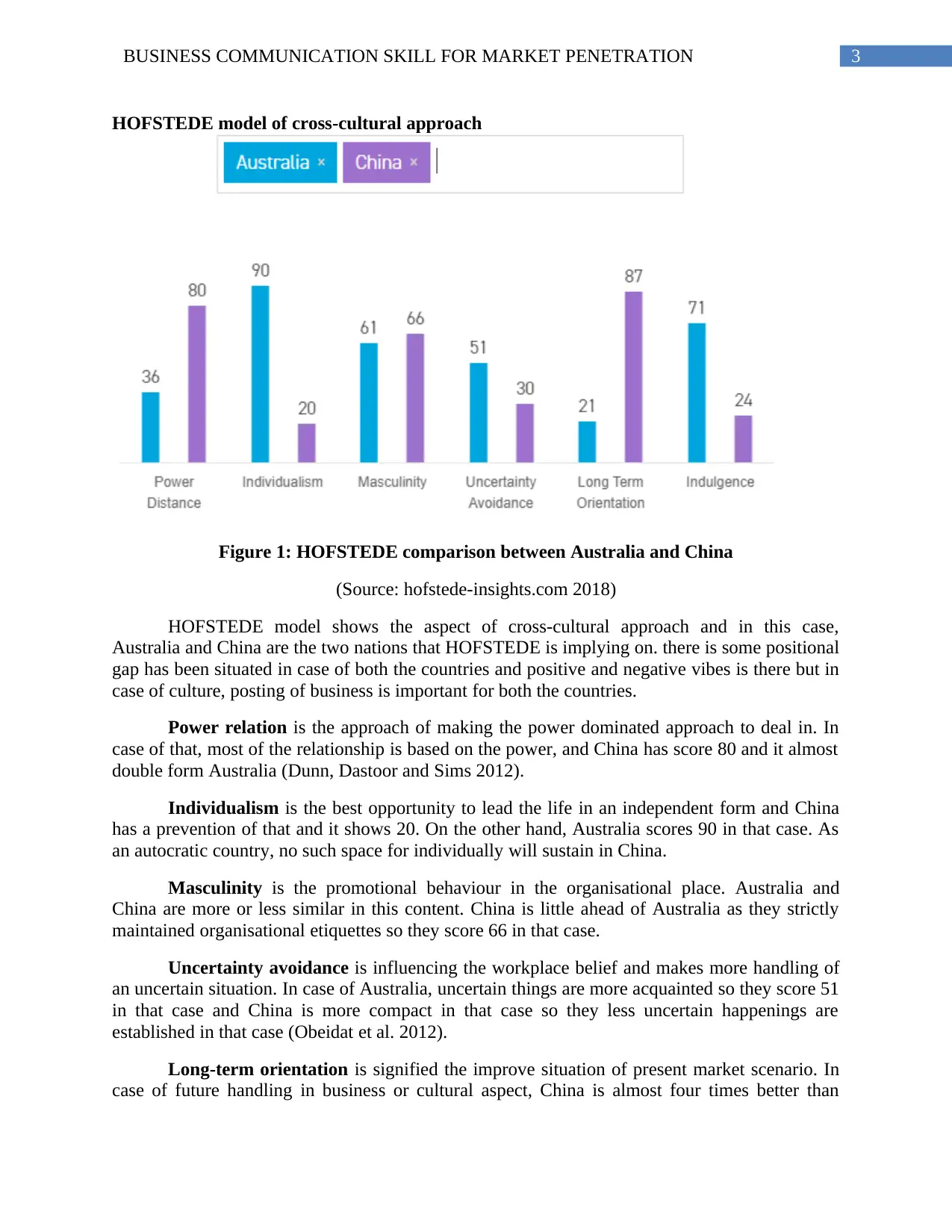
3BUSINESS COMMUNICATION SKILL FOR MARKET PENETRATION
HOFSTEDE model of cross-cultural approach
Figure 1: HOFSTEDE comparison between Australia and China
(Source: hofstede-insights.com 2018)
HOFSTEDE model shows the aspect of cross-cultural approach and in this case,
Australia and China are the two nations that HOFSTEDE is implying on. there is some positional
gap has been situated in case of both the countries and positive and negative vibes is there but in
case of culture, posting of business is important for both the countries.
Power relation is the approach of making the power dominated approach to deal in. In
case of that, most of the relationship is based on the power, and China has score 80 and it almost
double form Australia (Dunn, Dastoor and Sims 2012).
Individualism is the best opportunity to lead the life in an independent form and China
has a prevention of that and it shows 20. On the other hand, Australia scores 90 in that case. As
an autocratic country, no such space for individually will sustain in China.
Masculinity is the promotional behaviour in the organisational place. Australia and
China are more or less similar in this content. China is little ahead of Australia as they strictly
maintained organisational etiquettes so they score 66 in that case.
Uncertainty avoidance is influencing the workplace belief and makes more handling of
an uncertain situation. In case of Australia, uncertain things are more acquainted so they score 51
in that case and China is more compact in that case so they less uncertain happenings are
established in that case (Obeidat et al. 2012).
Long-term orientation is signified the improve situation of present market scenario. In
case of future handling in business or cultural aspect, China is almost four times better than
HOFSTEDE model of cross-cultural approach
Figure 1: HOFSTEDE comparison between Australia and China
(Source: hofstede-insights.com 2018)
HOFSTEDE model shows the aspect of cross-cultural approach and in this case,
Australia and China are the two nations that HOFSTEDE is implying on. there is some positional
gap has been situated in case of both the countries and positive and negative vibes is there but in
case of culture, posting of business is important for both the countries.
Power relation is the approach of making the power dominated approach to deal in. In
case of that, most of the relationship is based on the power, and China has score 80 and it almost
double form Australia (Dunn, Dastoor and Sims 2012).
Individualism is the best opportunity to lead the life in an independent form and China
has a prevention of that and it shows 20. On the other hand, Australia scores 90 in that case. As
an autocratic country, no such space for individually will sustain in China.
Masculinity is the promotional behaviour in the organisational place. Australia and
China are more or less similar in this content. China is little ahead of Australia as they strictly
maintained organisational etiquettes so they score 66 in that case.
Uncertainty avoidance is influencing the workplace belief and makes more handling of
an uncertain situation. In case of Australia, uncertain things are more acquainted so they score 51
in that case and China is more compact in that case so they less uncertain happenings are
established in that case (Obeidat et al. 2012).
Long-term orientation is signified the improve situation of present market scenario. In
case of future handling in business or cultural aspect, China is almost four times better than
Paraphrase This Document
Need a fresh take? Get an instant paraphrase of this document with our AI Paraphraser
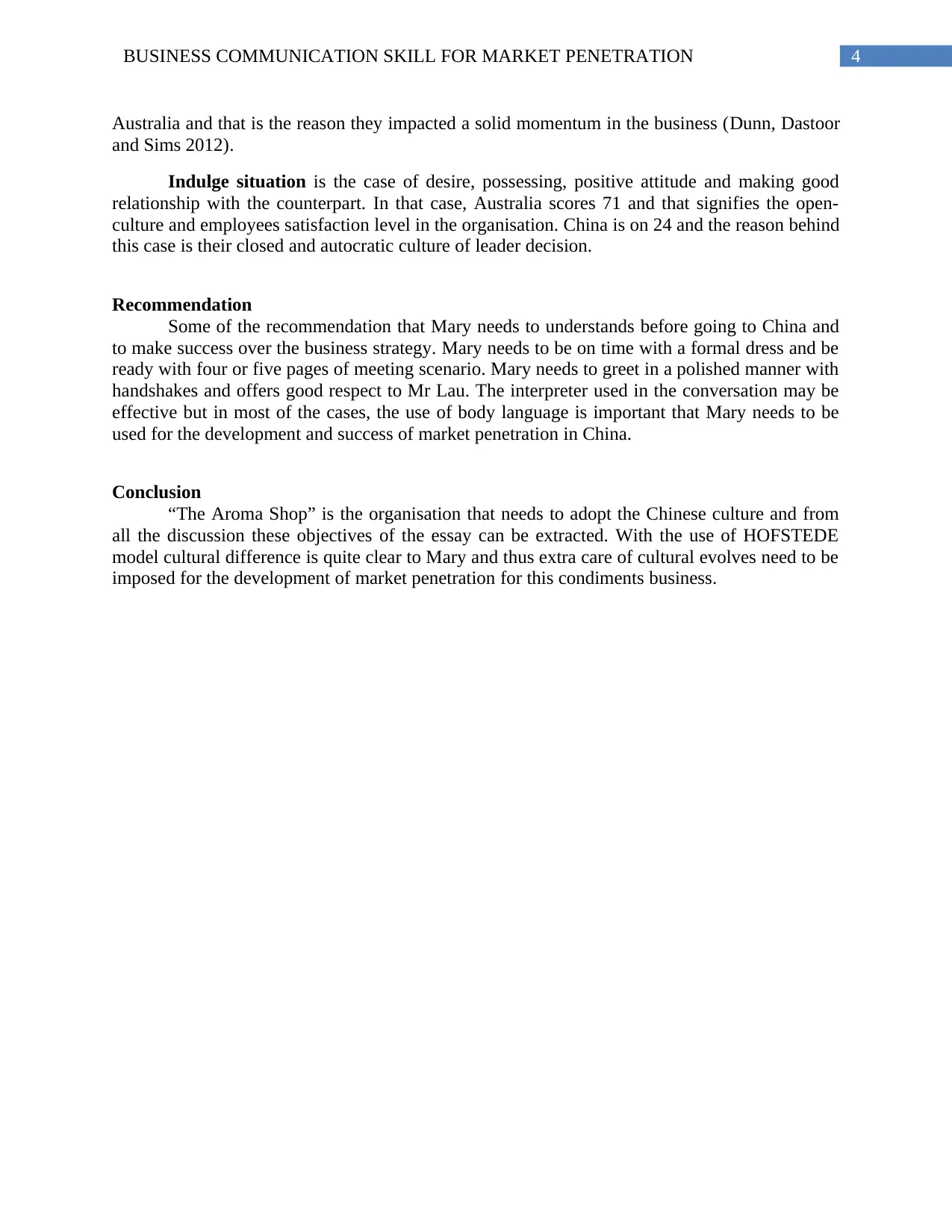
4BUSINESS COMMUNICATION SKILL FOR MARKET PENETRATION
Australia and that is the reason they impacted a solid momentum in the business (Dunn, Dastoor
and Sims 2012).
Indulge situation is the case of desire, possessing, positive attitude and making good
relationship with the counterpart. In that case, Australia scores 71 and that signifies the open-
culture and employees satisfaction level in the organisation. China is on 24 and the reason behind
this case is their closed and autocratic culture of leader decision.
Recommendation
Some of the recommendation that Mary needs to understands before going to China and
to make success over the business strategy. Mary needs to be on time with a formal dress and be
ready with four or five pages of meeting scenario. Mary needs to greet in a polished manner with
handshakes and offers good respect to Mr Lau. The interpreter used in the conversation may be
effective but in most of the cases, the use of body language is important that Mary needs to be
used for the development and success of market penetration in China.
Conclusion
“The Aroma Shop” is the organisation that needs to adopt the Chinese culture and from
all the discussion these objectives of the essay can be extracted. With the use of HOFSTEDE
model cultural difference is quite clear to Mary and thus extra care of cultural evolves need to be
imposed for the development of market penetration for this condiments business.
Australia and that is the reason they impacted a solid momentum in the business (Dunn, Dastoor
and Sims 2012).
Indulge situation is the case of desire, possessing, positive attitude and making good
relationship with the counterpart. In that case, Australia scores 71 and that signifies the open-
culture and employees satisfaction level in the organisation. China is on 24 and the reason behind
this case is their closed and autocratic culture of leader decision.
Recommendation
Some of the recommendation that Mary needs to understands before going to China and
to make success over the business strategy. Mary needs to be on time with a formal dress and be
ready with four or five pages of meeting scenario. Mary needs to greet in a polished manner with
handshakes and offers good respect to Mr Lau. The interpreter used in the conversation may be
effective but in most of the cases, the use of body language is important that Mary needs to be
used for the development and success of market penetration in China.
Conclusion
“The Aroma Shop” is the organisation that needs to adopt the Chinese culture and from
all the discussion these objectives of the essay can be extracted. With the use of HOFSTEDE
model cultural difference is quite clear to Mary and thus extra care of cultural evolves need to be
imposed for the development of market penetration for this condiments business.
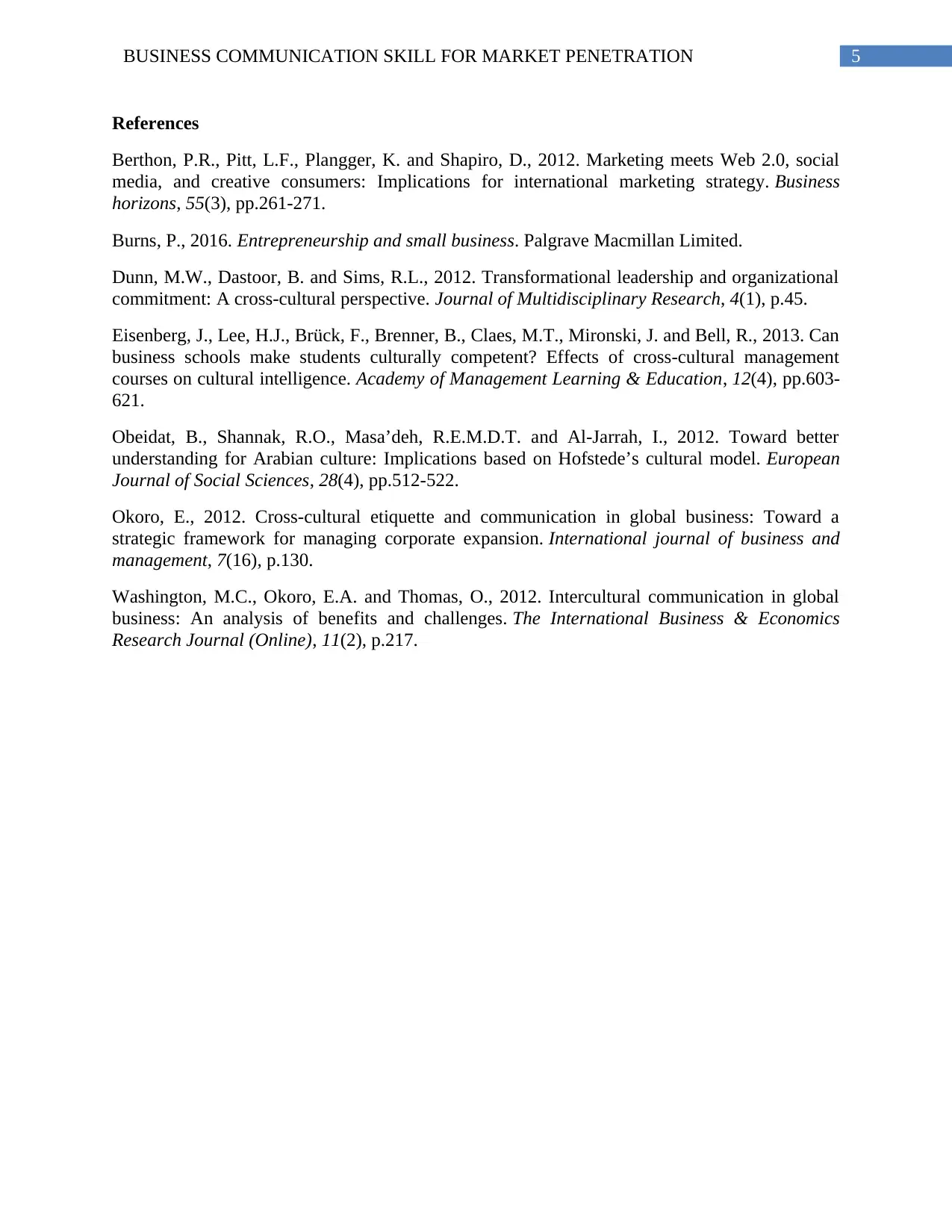
5BUSINESS COMMUNICATION SKILL FOR MARKET PENETRATION
References
Berthon, P.R., Pitt, L.F., Plangger, K. and Shapiro, D., 2012. Marketing meets Web 2.0, social
media, and creative consumers: Implications for international marketing strategy. Business
horizons, 55(3), pp.261-271.
Burns, P., 2016. Entrepreneurship and small business. Palgrave Macmillan Limited.
Dunn, M.W., Dastoor, B. and Sims, R.L., 2012. Transformational leadership and organizational
commitment: A cross-cultural perspective. Journal of Multidisciplinary Research, 4(1), p.45.
Eisenberg, J., Lee, H.J., Brück, F., Brenner, B., Claes, M.T., Mironski, J. and Bell, R., 2013. Can
business schools make students culturally competent? Effects of cross-cultural management
courses on cultural intelligence. Academy of Management Learning & Education, 12(4), pp.603-
621.
Obeidat, B., Shannak, R.O., Masa’deh, R.E.M.D.T. and Al-Jarrah, I., 2012. Toward better
understanding for Arabian culture: Implications based on Hofstede’s cultural model. European
Journal of Social Sciences, 28(4), pp.512-522.
Okoro, E., 2012. Cross-cultural etiquette and communication in global business: Toward a
strategic framework for managing corporate expansion. International journal of business and
management, 7(16), p.130.
Washington, M.C., Okoro, E.A. and Thomas, O., 2012. Intercultural communication in global
business: An analysis of benefits and challenges. The International Business & Economics
Research Journal (Online), 11(2), p.217.
References
Berthon, P.R., Pitt, L.F., Plangger, K. and Shapiro, D., 2012. Marketing meets Web 2.0, social
media, and creative consumers: Implications for international marketing strategy. Business
horizons, 55(3), pp.261-271.
Burns, P., 2016. Entrepreneurship and small business. Palgrave Macmillan Limited.
Dunn, M.W., Dastoor, B. and Sims, R.L., 2012. Transformational leadership and organizational
commitment: A cross-cultural perspective. Journal of Multidisciplinary Research, 4(1), p.45.
Eisenberg, J., Lee, H.J., Brück, F., Brenner, B., Claes, M.T., Mironski, J. and Bell, R., 2013. Can
business schools make students culturally competent? Effects of cross-cultural management
courses on cultural intelligence. Academy of Management Learning & Education, 12(4), pp.603-
621.
Obeidat, B., Shannak, R.O., Masa’deh, R.E.M.D.T. and Al-Jarrah, I., 2012. Toward better
understanding for Arabian culture: Implications based on Hofstede’s cultural model. European
Journal of Social Sciences, 28(4), pp.512-522.
Okoro, E., 2012. Cross-cultural etiquette and communication in global business: Toward a
strategic framework for managing corporate expansion. International journal of business and
management, 7(16), p.130.
Washington, M.C., Okoro, E.A. and Thomas, O., 2012. Intercultural communication in global
business: An analysis of benefits and challenges. The International Business & Economics
Research Journal (Online), 11(2), p.217.
⊘ This is a preview!⊘
Do you want full access?
Subscribe today to unlock all pages.

Trusted by 1+ million students worldwide
1 out of 6
Related Documents
Your All-in-One AI-Powered Toolkit for Academic Success.
+13062052269
info@desklib.com
Available 24*7 on WhatsApp / Email
![[object Object]](/_next/static/media/star-bottom.7253800d.svg)
Unlock your academic potential
Copyright © 2020–2026 A2Z Services. All Rights Reserved. Developed and managed by ZUCOL.




